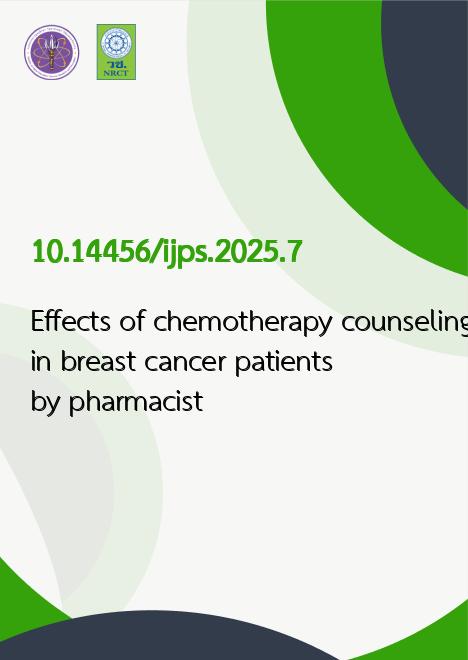
|
Effects of chemotherapy counseling in breast cancer patients by pharmacist |
|---|---|
| รหัสดีโอไอ | |
| Creator | Kanokkoj Budnampet |
| Title | Effects of chemotherapy counseling in breast cancer patients by pharmacist |
| Contributor | Chayanin Kumlung, Panyaporn Songsuntornwong, Adchada Hemachandra, Thepnarin Changprasert |
| Publisher | Faculty of Pharmaceutical Sciences KKU MSU UBU |
| Publication Year | 2568 |
| Journal Title | Isan Journal of Pharmaceutical Sciences |
| Journal Vol. | 21 |
| Journal No. | 2 |
| Page no. | 1-13 |
| Keyword | chemotherapy counseling, breast cancer, adherence, adverse drug reactions |
| URL Website | https://tci-thaijo.org/index.php/IJPS |
| Website title | Isan Journal of Pharmaceutical Sciences, IJPS |
| ISSN | 19050852 |
| Abstract | Breast cancer is the most common cancer among women. General treatment typically involves surgery, with some patients also requiring one of chemotherapy, radiotherapy, hormonal therapy or combination of these. However, non-compliance, often stemming from a lack of information and fear, can lead to recurrence and metastasis. Therefore, multidisciplinary care teams, incorporating pharmacists to provide information and counseling on cancer treatment, are crucial for improving patient adherence. Objectives: To compare pre-test and post-test knowledge scores regarding chemotherapy among breast cancer patients following pharmacist-led counseling. Additionally, this study aimed to assess treatment compliance, and the severity and management of adverse drug reaction (ADRs) to chemotherapy. Method: This prospective, descriptive study included 41 patients undergoing surgery during October 2018 to October 2019 at Nopparat Rajathanee Hospital. Patients received chemotherapy counseling from a pharmacist on two occasions: first, post-surgery (within one week) and second, at their follow-up appointment. Pretest and posttest scores were collected. ADRs were documented for patients receiving chemotherapy. Results: Among 41 patients, the median post-counseling knowledge score (9 points) was significantly higher than the pre-counseling score (7 points) (p < 0.001). A significant improvement (p = 0.001) was observed in the correct response to the question: ‘Is chemotherapy necessary for all cancer patients?’ Most patients (95.1%) initiated or continued chemotherapy/hormonal therapy on schedule; 4.9% experienced delays due to other medical procedures. The most frequently reported ADRs were gastrointestinal, including nausea (36.6%) and vomiting (22%). Most ADRs were non-severe. The highest severity reported was grade 3 vomiting (2.4%), requiring hospitalization. Conclusion: Pharmacist-led counseling contributed to improve patient knowledge regarding chemotherapy and supported the timely continuation of chemotherapy/hormonal therapy. |
